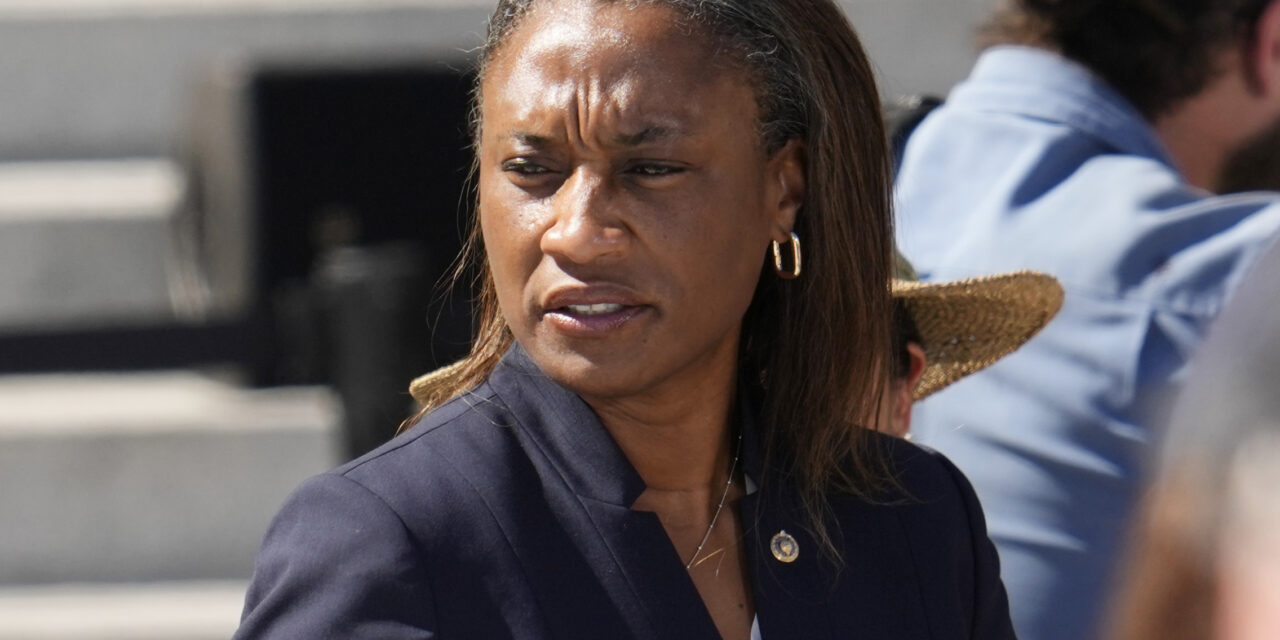
LOS ANGELES — California Sen. Laphonza Butler made at least $1 million from Airbnb stock and hundreds of thousands more in compensation during three years as a political and corporate consultant.
Financial disclosures filed during Butler’s tenure as a University of California regent from 2018 to 2021 paint the most detailed picture yet of the former labor leader’s foray into the private sector. The windfall and the list of business clients frequently targeted by the left, including Uber and Lyft, could make the Democratic senator vulnerable to attacks from progressives should she run for a full term.
The surge of interest in Butler’s finances is a byproduct of her whiplash-inducing debut into national politics after Gov. Gavin Newsom appointed her to the late Sen. Dianne Feinstein’s seat. In her path from behind-the-scenes political player to newly sworn in junior senator of California, Butler has emphasized her hardscrabble upbringing in rural Mississippi and her career in a labor movement centered around income inequality. Her subsequent lucrative professional moves complicate that narrative, though her earnings pale in comparison to the wealth of others in the Senate, including her late predecessor.
Butler has yet to say whether she will seek election to a full Senate term, with speculation growing increasingly frenzied as the window to launch a viable statewide 2024 campaign narrows by the day. If she does decide to run, her allies anticipate her relatively short stint in the private sector will draw increased scrutiny — and they’re prepared to combat any criticism about her client roster or high pay.
“If she were an older white man, all of those things would be framed as attributes,” said Holly Mitchell, a Los Angeles County supervisor and a longtime ally of Butler, the Senate’s first openly gay Black woman. “She has the unique leadership acumen and capacity to navigate all of those worlds.”
Like all elected officials in the state, Butler was required to file annual statements of economic interest as a member of the governing body of the University of California system. The filings delineate all sources of income, investments and business assets in varying increments, with asset values ranging from less than $2,000 to over $1,000,000. They offer more of a ballpark estimate of her take-home pay rather than a precise accounting.
Butler was earning a six-figure salary by the time she reached the heights of California’s labor world — leading SEIU 2015, a local representing in-home health care workers, as well as the union’s statewide organization. In 2018, she earned more than $250,000 as the leader of SEIU 2015, according to federal disclosure filings. (In the less-specific California filings, that salary was marked as over $100,000).
Still, she opened an even more affluent chapter in her career when she joined forces with Democratic strategists Ace Smith, Sean Clegg and Juan Rodriguez, whose client list includes Newsom and other Democratic luminaries in the state. The firm was known at the time as SCRB.
Butler made more than $100,000 in salary in 2018 and in 2019 and also held a partnership stake. The firm was valued at over $1 million in 2018 and between $100,001 and $1 million in 2019.
“She’s had financial success,” said Matt Wing, a spokesperson for the senator, “but her focus has always been empowering the underrepresented so others can have the same opportunity she’s had.”
Her jump into political consulting was widely seen at the time as preparation for Kamala Harris’ as-yet-unannounced presidential campaign. The then-senator announced her candidacy less than two months after Butler joined the firm.
“The Harris campaign was easily 95 percent of her portfolio,” Clegg said. “She rented an apartment in Baltimore and gave it everything she had.”
Wing, Butler’s spokesperson, said in the bulk of her time at SCRB, “She primarily worked to elect Black women” — referring to Harris and Mitchell, whom Butler advised in her 2020 supervisorial race.
She also consulted for her former union. April Verrett, who succeeded Butler as SEIU 2015’s president and is now the Secretary-Treasurer of SEIU’s national arm, said the local hired Butler to help smooth the leadership transition.
Her portfolio included the ride-sharing companies Uber — which was a client of the firm for years before her arrival — and Lyft. At the time, the companies were fiercely fighting legislation to treat independent contractors, including their drivers, as employees entitled to more benefits and the right to organize.
Butler was brought on to help explore a possible deal between the companies, which wanted to avoid reclassifying their workers, and labor unions, according to people familiar with the discussions who were granted anonymity to detail internal dynamics. The two sides could not come to agreement, and the ride-sharing companies ultimately won a costly ballot initiative campaign that exempted them from the law.
Following her Senate appointment, Butler faced early criticism from some in the Democratic Party’s left flank for her gig company consulting, which detractors say cut against the broader goals of the labor movement. But prominent union allies push back on the idea that she undermined workers by taking on those clients.
“I’ve known Laphonza Butler for many, many years — well over 20,” said Verrett of SEIU. “I have always known her to be someone who holds true to her values.”
The disclosures catalog all clients that paid the firm more than $10,000 in those years, even those that her former partners said she did not do work for. Corporate clients included PG&E, the San Francisco 49ers and AT&T. (A person familiar with AT&T’s contract with SCRB who was not authorized to speak publicly confirmed she did not work on the account).
The firm also represented nonprofits such as the Tides Foundation, a left-leaning group that has received substantial funding from Democratic megadonor George Soros, and political entities such as the Democratic Association of Secretaries of State and Bill Daley’s unsuccessful 2019 campaign for Chicago mayor.
In 2020, Butler left SCRB (which has since been rebranded as Bearstar Strategies) to be a director for public policy at Airbnb, where she brought in a salary of more than $100,000. She also reported owning — and selling — stocks in the company valued at over $1 million in 2021.
She stayed at the company for a year before leaving to become president of EMILY’S List, a national fundraising group that boosts female candidates who support abortion rights. Her EMILY’S List tenure was not included in the time period of her California disclosure filings.
The specifics of her resume were familiar to Newsom, who had considered hiring Butler as his chief of staff when he first became governor. In the years since, Butler remained close to many in his inner circle.
“The governor was well aware of Senator Butler’s career history, including her decades for fighting for working families and doing her work for the private sector,” said Anthony York, a spokesperson for Newsom.





